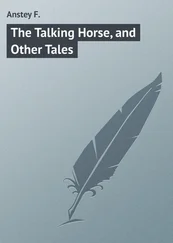A maid came and brought me a letter, and I sat down in the little conservatory to read it; but as I was about to break the seal, seeing the girl lingering, I asked her what she wanted.
She stammered something about a white rabbit that had been caught in the house, and asked what should be done with it. I told her to let it loose in the walled garden behind the house, and opened my letter. It was from Jack, but so incoherent that I thought he must have lost his reason. It was nothing but a series of prayers to me not to leave the house until he could get back; he could not tell me why, there were the dreams, he said—he could explain nothing, but he was sure that I must not leave the house in the Rue Sainte-Cécile.
As I finished reading I raised my eyes and saw the same maid-servant standing in the doorway holding a glass dish in which two gold-fish were swimming: “Put them back into the tank and tell me what you mean by interrupting me,” I said.
With a half-suppressed whimper she emptied water and fish into an aquarium at the end of the conservatory, and turning to me asked my permission to leave my service. She said people were playing tricks on her, evidently with a design of getting her into trouble; the marble rabbit had been stolen and a live one had been brought into the house; the two beautiful marble fish were gone, and she had just found those common live things flopping on the dining-room floor. I reassured her and sent her away, saying I would look about myself. I went into the studio; there was nothing there but my canvases and some casts, except the marble of the Easter lily. I saw it on a table across the room. Then I strode angrily over to it. But the flower I lifted from the table was fresh and fragile and filled the air with perfume.
Then suddenly I comprehended, and sprang through the hallway to the marble room. The doors flew open, the sunlight streamed into my face, and through it, in a heavenly glory, the Madonna smiled, as Geneviève lifted her flushed face from her marble couch and opened her sleepy eyes.
IN THE COURT OF THE DRAGON
“Oh, thou who burn’st in heart for those who burn
In Hell, whose fires thyself shall feed in turn;
How long be crying—‘Mercy on them.’ God!
Why, who art thou to teach and He to learn?”
In the Church of St. Barnabé vespers were over; the clergy left the altar; the little choir-boys flocked across the chancel and settled in the stalls. A Suisse in rich uniform marched down the south aisle, sounding his staff at every fourth step on the stone pavement; behind him came that eloquent preacher and good man, Monseigneur C——.
My chair was near the chancel rail, I now turned toward the west end of the church. The other people between the altar and the pulpit turned too. There was a little scraping and rustling while the congregation seated itself again; the preacher mounted the pulpit stairs, and the organ voluntary ceased.
I had always found the organ-playing at St. Barnabé highly interesting. Learned and scientific it was, too much so for my small knowledge, but expressing a vivid if cold intelligence. Moreover, it possessed the French quality of taste: taste reigned supreme, self-controlled, dignified and reticent.
To-day, however, from the first chord I had felt a change for the worse, a sinister change. During vespers it had been chiefly the chancel organ which supported the beautiful choir, but now and again, quite wantonly as it seemed, from the west gallery where the great organ stands, a heavy hand had struck across the church at the serene peace of those clear voices. It was something more than harsh and dissonant, and it betrayed no lack of skill. As it recurred again and again, it set me thinking of what my architect’s books say about the custom in early times to consecrate the choir as soon as it was built, and that the nave, being finished sometimes half a century later, often did not get any blessing at all: I wondered idly if that had been the case at St. Barnabé, and whether something not usually supposed to be at home in a Christian church might have entered undetected and taken possession of the west gallery. I had read of such things happening, too, but not in works on architecture.
Then I remembered that St. Barnabé was not much more than a hundred years old, and smiled at the incongruous association of mediaeval superstitions with that cheerful little piece of eighteenth-century rococo.
But now vespers were over, and there should have followed a few quiet chords, fit to accompany meditation, while we waited for the sermon. Instead of that, the discord at the lower end of the church broke out with the departure of the clergy, as if now nothing could control it.
I belong to those children of an older and simpler generation who do not love to seek for psychological subtleties in art; and I have ever refused to find in music anything more than melody and harmony, but I felt that in the labyrinth of sounds now issuing from that instrument there was something being hunted. Up and down the pedals chased him, while the manuals blared approval. Poor devil! whoever he was, there seemed small hope of escape!
My nervous annoyance changed to anger. Who was doing this? How dare he play like that in the midst of divine service? I glanced at the people near me: not one appeared to be in the least disturbed. The placid brows of the kneeling nuns, still turned towards the altar, lost none of their devout abstraction under the pale shadow of their white head-dress. The fashionable lady beside me was looking expectantly at Monseigneur C——. For all her face betrayed, the organ might have been singing an Ave Maria.
But now, at last, the preacher had made the sign of the cross, and commanded silence. I turned to him gladly. Thus far I had not found the rest I had counted on when I entered St. Barnabé that afternoon.
I was worn out by three nights of physical suffering and mental trouble: the last had been the worst, and it was an exhausted body, and a mind benumbed and yet acutely sensitive, which I had brought to my favourite church for healing. For I had been reading The King in Yellow.
“The sun ariseth; they gather themselves together and lay them down in their dens.” Monseigneur C—— delivered his text in a calm voice, glancing quietly over the congregation. My eyes turned, I knew not why, toward the lower end of the church. The organist was coming from behind his pipes, and passing along the gallery on his way out, I saw him disappear by a small door that leads to some stairs which descend directly to the street. He was a slender man, and his face was as white as his coat was black. “Good riddance!” I thought, “with your wicked music! I hope your assistant will play the closing voluntary.”
With a feeling of relief—with a deep, calm feeling of relief, I turned back to the mild face in the pulpit and settled myself to listen. Here, at last, was the ease of mind I longed for.
“My children,” said the preacher, “one truth the human soul finds hardest of all to learn: that it has nothing to fear. It can never be made to see that nothing can really harm it.”
“Curious doctrine!” I thought, “for a Catholic priest. Let us see how he will reconcile that with the Fathers.”
“Nothing can really harm the soul,” he went on, in, his coolest, clearest tones, “because——”
But I never heard the rest; my eye left his face, I knew not for what reason, and sought the lower end of the church. The same man was coming out from behind the organ, and was passing along the gallery the same way. But there had not been time for him to return, and if he had returned, I must have seen him. I felt a faint chill, and my heart sank; and yet, his going and coming were no affair of mine. I looked at him: I could not look away from his black figure and his white face. When he was exactly opposite to me, he turned and sent across the church straight into my eyes, a look of hate, intense and deadly: I have never seen any other like it; would to God I might never see it again! Then he disappeared by the same door through which I had watched him depart less than sixty seconds before.
Читать дальше












